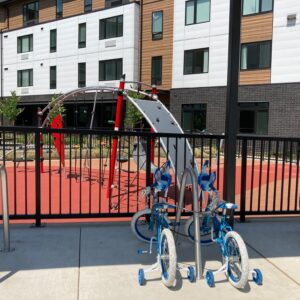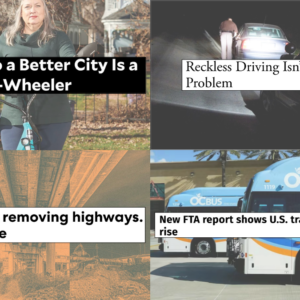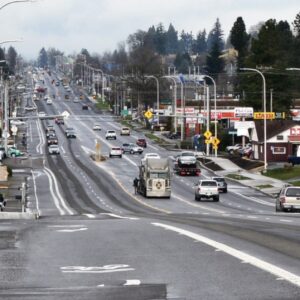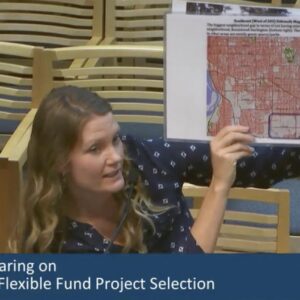
Widely-read New York Times op-ed columnist and regular NewsHour pundit David Brooks penned a column today that urged our government and leaders to put infrastructure projects on the fast-track.
Calling it a “National Mobility Project”, Brooks thinks that the wisest way for government to hasten an economic recovery is through shifting the paradigm on how America plans and builds transportation infrastructure projects.
He writes:
…an infrastructure resurgence is desperately needed. Americans now spend 3.5 billion hours a year stuck in traffic… The U.S. population is projected to increase by 50 percent over the next 42 years. American residential patterns have radically changed. Workplaces have decentralized. Commuting patterns are no longer radial, from suburban residences to central cities. Now they are complex weaves across broad megaregions. Yet the infrastructure system hasn’t adapted.
Brooks’ idea, in general, is nothing new. National advocacy and lobbying groups like Transportation for America (and their “Build for America” campaign), the American Association of State Highway and Transportation Officials (AASHTO), and even state-level leaders like Oregon’s Governor Ted Kulongoski are pushing the idea of economic stimulus (via jobs creation) through more infrastructure projects.
The momentum around this issue is exciting and it seems America is poised for a massive re-investment in this area.
Now we’re faced with another question: What should America’s new transportation infrastructure look like?
Should we invest billions into highway projects that cater to “mobility” of single-occupancy vehicles (like we did in the 1950s) and throw scraps to everything else (like we do now)? Or, will we look to create world-class biking cities where possible (because bikes offer the best return on transportation investment of any mode) and then invest in things like passenger rail, streetcars and bus-rapid transit?
It seems obvious that the latter scenario will win the day; but I wouldn’t count on it yet.
If you asked David Brooks (and politicians to his right), you might be surprised at what you’d hear.
In a column he wrote back in July, Brooks seemed to mock the idea of bicycles as being a serious part of good energy policy. In The Coming Activist Age, he wrote:
The high point of his (John McCain’s) campaign, so far, has been his energy policy, which is comprehensive and bold, but does not try to turn us into a nation of bicyclists. It does not view America’s energy-intense economy as a sign of sinfulness.
And Brooks is not alone. During a ceremony in Texas to celebrate the opening of a new, 18-lane, $2.8 billion highway, the Houston Chronicle noted* the excitement from Governor Rick Perry:
Perry noted the roar of traffic below, above and around the crowd, which was gathered on a frontage road overpass.
“This is the sound of freedom we hear,” he said. “These people need roads to get to work, to church and to school.“
If we’re going to put our country into even more debt to pay for an aggressive infrastructure investment plan, it should be complemented with a paradigm shift in how we define “mobility”.







Thanks for reading.
BikePortland has served this community with independent community journalism since 2005. We rely on subscriptions from readers like you to survive. Your financial support is vital in keeping this valuable resource alive and well.
Please subscribe today to strengthen and expand our work.
Brooks doesn’t spell out what he means by that statement:
“The high point of his (John McCain’s) campaign, so far, has been his energy policy, which is comprehensive and bold, but does not try to turn us into a nation of bicyclists. It does not view America’s energy-intense economy as a sign of sinfulness.” David Brooks, The Coming Activist Age, NYTimes
My impression of McCain’s energy policy, is that he’s not so concerned with cutting back consumption as he is with allocating new supplies, simply to sustain our existing type of car dominant transportation infrastructure. Whether the U.S.’s devotion to using such supplies amounts to sinfulness or not is beside the point.
The point that Brooks misses is that historic dependence of the U.S upon easy access to vast quantities of cheap energy has ultimately weakened our transportation infrastructure. The U.S. has created an infrastructure that is difficult, prohibitively expensive to maintain, and does not provide its citizens with the kind of community lifestyle they need in today’s age.
While in the minds of some people, it might not be such a worthy idea to change the U.S. into a “…a nation of bicyclists.”, it might well be worth it to start putting a lot more emphasis upon planning new communities, re-planning old ones so that the bicycle is increasingly a viable, appealing option for transportation. We may need this sooner than people like Brooks ever could have possibly imagined. Especially if McCain were to get elected.
What wsbob said, and that Brooks has been universally panned by those who pay attention as being perpertually wrong.
Case in point:
Clicky
http://www.phillymag.com/articles/booboos_in_paradise/
Building truly useful, thoughtful, intentional infrastructure is good work. It provides good, living wage jobs, and could serve to strengthen the economy and make communities stronger. Or it could be more, bigger, wider freeways and an entrenchment of the car culture in its dying throes, as well as a crutch to a food transportation system that needs to face reality – we must, for our survival, switch (back) from petroleum-based to solar-based agriculture. The average distance our food travels is 1500 miles and this is insupportable. A metaphor: gas prices ebb and flow like waves. Right now the wave is receeding, but anyone who knows about tsunamis knows that when the wave goes way out, things are about to get very bad. Peak oil and conservation MUST be the backdrop for the transportation infrastructure planning the next administration will lead.
The questions that need to be asked: In ten years will we using more energy per capita than we are now? (Which we suck at.) Will we be using more energy per unit of GDP? (Which we don’t suck at.)
Transportation policy should follow from that conversation. McCain has proven to be a transportation cretin for over 40 years. Obama is learning day by day, but frankly I have little hope he can steer clear of the lobbyists headed his way.
I read this article in the Times this morning and I think now is the time to amp up the discussion on Complete Streets.
http://www.completestreets.org/
One advantage of improving pedestrian and bike infrastructure over large freeway projects is they can be approved faster since they are by nature smaller. There is a huge backlog of these projects, many include upgrading and repairing existing bridges and roads, for a start how about SE Powell and the Sellwood bridge.
Jonathan, invite David Brooks to Portland to see what cycling can be.
He’s a moderate.
If you’ve watched the arc of his columns over time, as I have, you will sense someone with an open mind, willing to entertain and reinterpret new facts. He is not an ideologue, but he’s probably not a cyclist either.
I’d put him in the same “conservative” camp as Oregon’s great progressive Republicans like McCall, Myers, and Paulus.
Let’s not over-interpret Brooks’s remark about “turning us into a nation of bicyclists.” Instead, let’s try to convince him that cycling is a rational and viable alternative.
I enjoy watching conservatives distance themselves from what have been considered Republican positions like reduced social investment.
Brooks is a good barometer for the national Republican guilt and remorse level.
It’s a good thing when someone can venture out of their conservative bunker. Support them.
I’ve followed and listened to this guy for years (like 20 years) he tends to follow which ever way the wind blows.
Down with mobility!
Long-live proximity!
I think Brooks “moderate” views supporting the illegal invasion of Iraq disqualify him from having intellectual authority on just about anything. He’s a right wig schill and he should be in jail for propagating the crime of occupation.
I noticed a few somewhat forward thinking bits in the new Houston Freeway. It was built strong enough to replace lanes with rail in the future, and some of the lanes are not only carpool only, but have congestion pricing too. Compared to Portland this may seem like not much forward thinking at all, but you gotta keep in mind almost all of Houston’s income is from the Oil industry. If you read the comments on the story you will find that many people believe that it failed at solving the congestion problems. Maybe they will get a rail line after all.